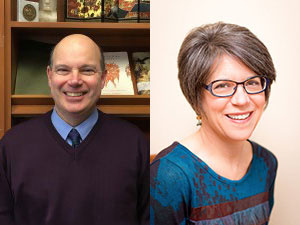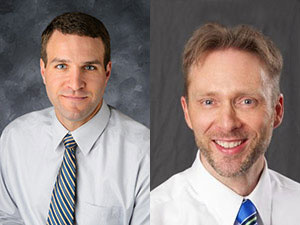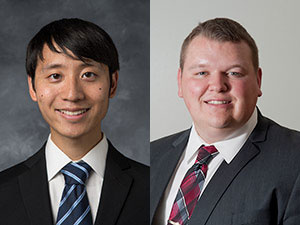At the close of every spring semester, University of Iowa shared governance bodies elect new leadership. Together, Faculty Senate, Staff Council, UI Student Government (UISG), and Graduate and Professional Student Government (GPSG) shape policies and inform decisions that affect the UI’s more than 30,000 students and about 18,000 employees. They represent students, faculty, and staff to the UI administration; the Board of Regents, State of Iowa; the public; and state and federal government.
Read about the skills and experience they bring to their new positions and what they aim to accomplish this year.
Faculty Senate

Russell Ganim, president of Faculty Senate, is a professor in and director of the Division of World Languages, Literatures, and Cultures; Departmental Executive Officer (DEO) of both the French and Italian and German departments; and head of the American Sign Language Program.
Sandra Daack-Hirsch, vice president of Faculty Senate, is an associate professor and director of the PhD program in the College of Nursing.
What experiences inform your new position?
Ganim: The experiences that inform my position as president of the UI Faculty Senate stem from my time as a faculty member, a DEO, a division director, as chair of the CLAS Faculty Assembly, and as a member of Faculty Council and as a Faculty Senate officer last year.
Daack-Hirsch: I have been a member of the University of Iowa community for 37 years, first as a student and then as staff. In 2007, I joined the faculty. For the past six years I’ve been a faculty senator and have served on Faculty Council.
What do you think are the important issues facing faculty, and how do you plan to address them?
Ganim and Daack-Hirsch: We think that faculty would like us to be engaged in matters related to the university budget and planning, the Faculty Senate’s review of central administrative offices, and the searches for key administrative positions in the coming year. We plan to address these issues by making sure that faculty are closely involved and that their voices will influence key decisions concerning the university’s future.
The UI will also host the annual Big Ten Academic Alliance Shared Governance conference in late October and we will circulate the agenda to the campus.
What can faculty expect from you in the coming months?
Ganim: The university community can expect communication from the Faculty Senate on the above topics as well other issues that affect the direction of the UI. We are always here to listen to faculty concerns and to act on them in the most effective way possible.
Daack-Hirsch: One of our most important roles is to facilitate, maintain, and create capacity for faculty to be involved in decisions about research and discovery, student success, and engagement.
Staff Council

Michael Hesseltine, president of Staff Council, is operations manager for the UI Patient Access Center at UI Health Care.
Michael Weaver, vice-president of Staff Council, is assistant to the vice president for research in the Office of the Vice President for Research.
What experiences inform your new position?
Hesseltine: Living in the area for most of my life, I have been touched by the University of Iowa in so many ways. I received my undergraduate degree here and have worked in health care for years. Like many of us who work for the University of Iowa, I feel a deep pride in our institution. Joining Staff Council just made sense to me. I wanted to give something back to this special place.
Weaver: I grew up in Iowa City, and both of my parents spent their careers as UI staff members. I have been a staff member here myself since October 2011. I was raised with a deep connection to UI staff and the issues we have faced over many years. I feel fortunate to have been elected to Staff Council last year and to have co-chaired the University Relations Committee. This experience let me interact with top university administrators as well as state legislators as our committee represented the interests of the UI and its faculty, staff, and students.
What do you think are the important issues facing UI staff today, and how do you plan to address them?
Hesseltine: Our biggest challenge currently is funding from the State of Iowa. We have been experiencing a generational disinvestment in higher education. With budget challenges come new workplace stresses. With these challenges in mind, staff council members will want to assist the staff we represent by maintaining positive engagement and continuing to advocate for and develop staff. Diversity and inclusion of all staff is a theme which should be ingrained into the fabric of all that we do. I believe we need to work daily to be collaborative and make the UI a welcoming and inclusive place for all.
Weaver: To borrow a phrase from President Bruce Harreld, we are in the midst of a generational disinvestment in higher education. Declining support from the state has already forced the institution to make difficult cuts and this trend does not appear to be slowing. In an effort to protect student success, the cuts so far have mostly affected staff members. I don’t disagree with this as our students should be the institution’s top priority, but it is critical that Staff Council remain involved as future cuts are considered so that the interests of affected staff members remain an important consideration.
Related issues will include staff workloads, salary policy, and employee benefits.
What can UI staff expect from Staff Council in the coming months?
Hesseltine: We are endeavoring to step up our engagement with staff and all those we serve throughout the coming year—and not just during work hours. To this end, we must make ourselves more visible and become involved in all aspects of campus life.
Weaver: This year’s Staff Council is an energized and ambitious group. Each committee has a set of initiatives that we will pursue under the goal of greater visibility across campus. Look for councilors to be more engaged with their constituencies as the voice for the UI.
UI Student Government (UISG)

Hira Mustafa, UISG president, is a fourth-year undergraduate from West Des Moines, Iowa, majoring in interdepartmental studies with an emphasis on workplace practices and perspectives, as well as ethics and public policy. She is minoring in philosophy.
Heath Schintler, UISG vice president, is a fourth-year undergraduate from Kalona, Iowa, majoring in both political science and ethics and public policy.
What experiences inform your new position?
Mustafa: My experience as a resident assistant best prepared me for my role as student body president. Being a first responder to concerns like mental health crises, substance abuse, and food insecurity gave me an in-depth understanding of the issues that students face, and what it takes to connect those students to the resources UI has available. This experience informs my advocacy for student needs and helps me understand what solutions are most impactful and effective.
Schintler: I’ve done a lot of work with Fraternity and Sorority Life in my time at the UI. I served on my chapter’s executive board for two years, on the Interfraternity Council executive board for a year as vice president of risk reduction and management, and on Delta Tau Delta’s national Undergraduate Council for two years, which included a year as chairman. I’ve also had the privilege of serving as a Hawkeye guide at orientation, and as a senator in UISG. These roles provided me with unique experiences in leadership, collaboration, and dealing with adversity—providing me a steady foundation to successfully serve the student body as their vice president.
What do you think are the important issues facing undergraduates, and how do you plan to address them?
Mustafa: Issues related to justice and equity are important to the student body. Iowa has a rich history of social justice and of having a diverse student body. The university is focused on continuing to improve the retention of underrepresented students and faculty. This will further enhance the experiences of our students by expanding unique mentorship opportunities, and it will improve professional and academic outcomes. I also look forward to reviewing university data on our campus climate, which will inform UISG’s work and guide us on how to make UI more inclusive of all community members.
Schintler: Affordability at any university is more pertinent now than ever. Too many students are food insecure, housing insecure, and loading themselves with increasing debt all across America, and the UI is no exception. Students today require more resources for a multitude of new issues they’re facing, and we as their student representatives need to step up to create, find, or bolster those resources.
What can undergraduates expect from you in the coming months?
Mustafa: The UI community can expect to see me present and engaged everywhere on campus. I believe the most impactful advocacy comes from a deep, holistic understanding of one’s community, so I want to build as many relationships as possible during my term. I plan to continue attending as many campus events as possible and push myself to engage with populations that don’t yet have a strong relationship with UISG; this includes building a stronger partnership with faculty and staff members.
Heath: The UI campus can expect a unified vision for UISG, and a continuation of the tremendous progress our organization has made in the last five years. There are many inspiring leaders who are passionate, motivated, and committed to creating tangible progress at our university. With varied experiences and perspectives from all corners of campus, we are still focused on the singular goal of providing the best possible student experience.
Graduate and Professional Student Government (GPSG)

Dexter Golinghorst, president of GPSG, is a third-year student in the College of Law with a focus on health care related law and a first-year masters of health administration (or MHA) student. He is from Maysville, Iowa.
Thomas Pak, vice-president of GPSG, is a second-year medical student in the Roy J. and Lucille A. Carver College of Medicine and a second-year PhD student in the Interdisciplinary Graduate Program in Neuroscience. He is from Clive, Iowa.
What experiences inform your new position?
Golinghorst: I am excited to serve as GPSG president after several years of involvement in student government leadership at the UI. I am a juris doctor and masters in health administration student, so I understand both the graduate and professional student experience. I was both a senator and the governmental relations liaison in UISG. In my first year of law school, I served as a GPSG delegate, and then was president of the Iowa Student Bar Association during my second year. My general experiences on campus over the past five years also inform how I identify and think about issues needing GPSG solutions.
Pak: GPSG represents and advocates for a diverse array of graduate and professional students. It is a significant responsibility that involves communicating with students, faculty, politicians, and the community. As an MD/PhD student and as co-president of Alpha Kappa Kappa, a health professional medical fraternity, I am invested in both the graduate and professional students of our campus and have experience with a diverse range of professional students.
In addition, I have experience in political advocacy with medical societies, including Iowa Medical Society and the American Academy of Pediatrics. I also have experience advocating for Howard Hughes Medical Institute medical fellows as their regional co-chair.
What do you think are the important issues facing graduate and professional students, and how do you plan to address them?
Golinghorst: I think the biggest issues facing graduate and professional students are affordability and access to programs at Iowa. Iowa is a nationally recognized institution, but generational divestment by the state government has forced tough decisions. I only see this continuing in the immediate future, and students are then required to make up those dollars in increased tuition rates. I am working closely with legislators, the Board of Regents, and UI leadership to find innovative solutions to this problem. We are working closely with UISG and Iowa City leaders to find ways to increase access to affordable housing and to increase student awareness of their rights as tenants. Another issue I’m prioritizing is graduate student retention in Iowa. The UI offers some of the world’s best graduate and professional programs and, in several cases, offers the only such public programs in the state. Each day brings new and important issues to the forefront, and I am always willing and eager to hear from constituents about their concerns.
Pak: The most important issue is making sure our voices are heard. This has downstream effects on how we address other issues such as controlling the cost of graduate and professional school, and creating a more inclusive and safer environment. A key part of controlling the cost of higher education is educating administrators and elected officials about how expensive higher education is for students and the importance of graduate and professional students to the state of Iowa.
To create a more inclusive and safer environment, GPSG is partnering with the university and advocating for issues that affect our student body. GPSG helps fund Safe Ride, the Rape Victim Advocacy Program, the Johnson County Crisis Center, and the Cultural and Resource Centers. GPSG safety chair, Loc Nguyen, a second-year PharmD student in the College of Pharmacy,
is helping with the search for a title IX investigator, and GPSG diversity chair, Danielle Thomas, a second-year PhD student in the College of Engineering, is helping with the search for a Chief Diversity Officer.
What can graduate and professional students expect from GPSG in the coming months?
Golinghorst: In the coming months, GPSG will emphasize the importance of not only voter registration, but voter participation. We think it is important the students at Iowa vote in Iowa as the decisions of our elected officials directly impact how the UI operates. We will roll out new partnerships with UISG, the graduate and professional schools, and within GPSG to increase interprofessional collaboration among our students, which we think will provide rich opportunities to improve research projects and find creative solutions to societal issues. We also will continue our work advocating to elected officials on behalf of graduate and professional students. I hope to personally get to know as many of my constituents as possible, and look forward to opportunities to do so.
Pak: I am enthusiastic about Friday Night Vibes, led by GPSG interprofessional co-chairs, Briar Voy, a second-year DDS student in the College of Dentistry, and Suman Rijal, a fourth-year PharmD student in the College of Pharmacy. Friday Night Vibes is a social event open to all graduate and professional students. One of the strengths of the UI is that we have a diverse set of graduate and professional students. However, as an MD/PhD student, I’ve seen how easy it is to get isolated in your particular school and these events help with connecting our graduate and professional students.